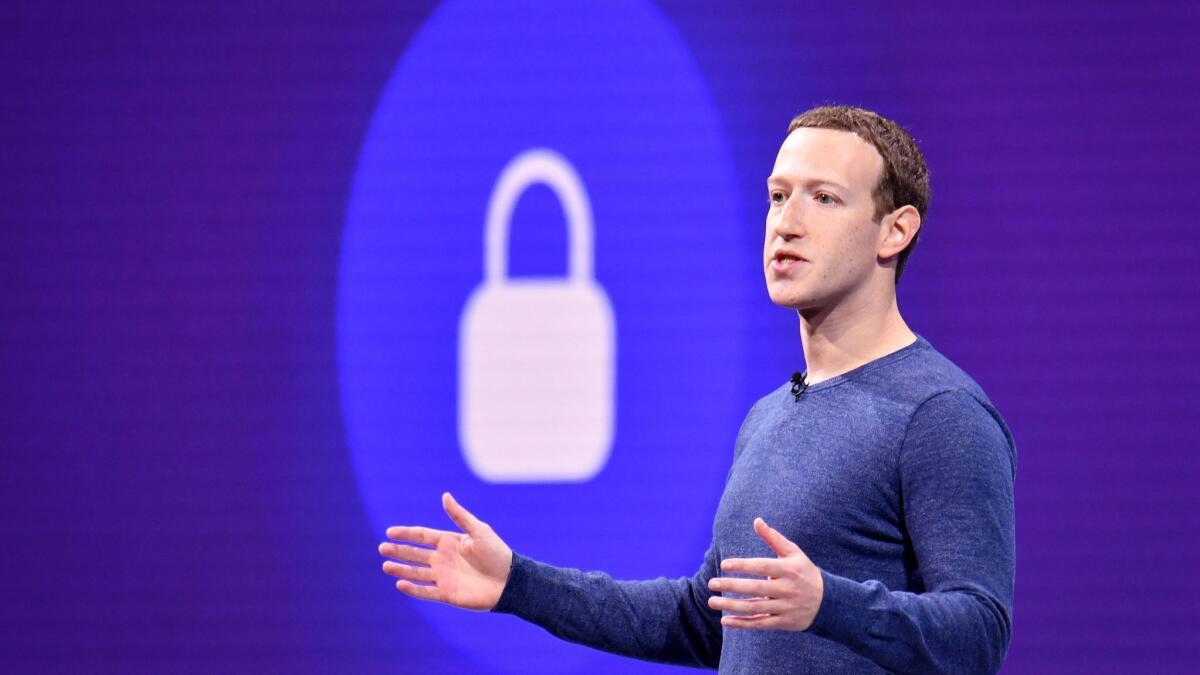Facebook’s Libra digital currency may force Washington to clarify crypto policy

- Share via
Facebook Inc.’s decision to create its own digital money — with the grandiose ambition of establishing an alternative global financial system — is jump-starting a long-simmering debate in Washington over how to regulate cryptocurrency.
For years, U.S. regulators and lawmakers have bickered over how to tackle the thorny issues surrounding the emergence of cryptocurrencies, such as protecting consumers and preventing crime. But the entry of a big and controversial company such as Facebook could force their hand.
At least six federal agencies that have some say in cryptocurrency oversight could slow, or even derail, Facebook’s plans, former regulators said. The company is already under the spotlight for a series of policy stumbles and scandals that have many lawmakers itching for a fight.
“Facebook is going to get whacked a number of different ways,’’ predicted Patrick McCarty, a former Commodity Futures Trading Commission official who teaches a class on cryptocurrencies at Georgetown University’s law school and lobbies on the issue. “The company went into another area that many in Congress are very skeptical about. It’s like they are doubling down on hot-button issues.”
A number of Democrats on Capitol Hill swiftly criticized Facebook’s Tuesday announcement and called for additional scrutiny of the technology company. Rep. Maxine Waters (D-Los Angeles), the chairwoman of the House Financial Services Committee, demanded that Facebook hit the pause button “until Congress and regulators have the opportunity to examine these issues and take action.”
The Senate Banking Committee, led by Chairman Sen. Michael D. Crapo (R-Idaho), will hold a hearing next month to focus at least partly on privacy issues, showing lawmakers’ skepticism that Facebook can protect its users’ financial information.
“Facebook is too big and too powerful,” Ohio Sen. Sherrod Brown, the top Democrat on the banking panel, said in a Bloomberg Television interview. “We want to shine a light on this and then figure out what Facebook is trying to do and then begin to move with the regulators to protect the financial system and protect the economy, especially with the attacks on privacy that Facebook is so well known for.”
Facebook said it would address lawmakers’ concerns.
Despite the bitcoin investment craze and a series of fraudulent initial coin offerings, Congress has not moved to pass legislation setting out an approach for dealing with the industry. That has left regulators such as the Securities and Exchange Commission, the Federal Reserve, the Commodity Futures Trading Commission and parts of the Treasury Department to sort it out among themselves.
In a 12-page white paper detailing Facebook’s plans, the company said it has set up a nonprofit organization in Switzerland to govern the payment network and hold a reserve of bank deposits and short-term government securities that will back the coin.
What’s unclear from the paper, however, is what kind of government oversight the cryptocurrency will have.
That’s been a particularly sensitive topic in Washington, where policymakers have failed to agree on an overarching policy for regulating virtual money. That gray area has allowed many coins to flourish but also has enabled fraud and other criminal activity such as money laundering.
Many government officials aren’t even sure how cryptocurrencies should be classified under the law and which agency might be responsible for them. Are they securities? Are they commodities? Are they just a newfangled form of cash?
Some have argued that digital coins should be monitored by the SEC because they often trade on exchange-like platforms and in some ways act like stocks. Others have pushed for the CFTC to oversee the products because they resemble currencies that underlie some futures products.
The Federal Trade Commission, which has some oversight of tech companies, could make the argument that it should regulate cryptocurrencies, lawyers who work on the issue said. The Federal Bureau of Investigation and the Internal Revenue Service also claim some jurisdiction.
Bank regulators, while not a primary cryptocurrency watchdog, have been involved in digital currency policy talks. Fed Chairman Jerome H. Powell told reporters on Wednesday that the central bank would want to ensure that there aren’t “safety and soundness” issues for the financial system should Facebook go forward with Libra.
Some cryptocurrency trading platforms operate as money services businesses, like PayPal or Western Union. Those firms have to register with the Financial Crimes Enforcement Network, an arm of the Treasury Department that combats money laundering, and also in the states where they operate.
Still, with a behemoth such as Facebook getting in the game, former regulators said the federal government may have to come up with a better system than the current patchwork of oversight.
More to Read
Inside the business of entertainment
The Wide Shot brings you news, analysis and insights on everything from streaming wars to production — and what it all means for the future.
You may occasionally receive promotional content from the Los Angeles Times.










